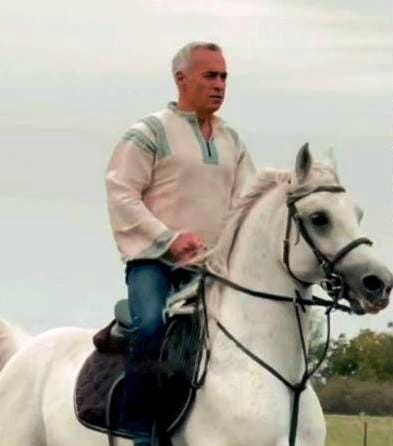The man from TikTok
Strange candidates in Romania, tough times for foreign workers and for women's rights. Plus: an iconic fighter, and Jugoesperanto
Hiya,
Welcome to Balkan Brew — the newsletter that delivers the freshest news from the Balkans, handpicked just for you every Friday morning. For the first time, I’m flying solo here since Tommaso is off enjoying some well-earned rest. That means the Old Guard is in charge, and we can finally dive into the real stuff: fixed telephones, Oasis, faxes, sky-high mortgages, and the eternal quest to find the best painkiller for a stiff neck.
But enough of this Millennial rambling. It’s been a packed week! A mysterious Stranger has emerged from the TikTok wilderness to dominate the first round of the Romanian presidential election. Meanwhile, foreign workers in Croatia are really not living their best lives, and women in Turkey are taking to the streets to protest against gender-based violence. But also — can you speak Jugoesperanto? And finally: the tale of a freedom fighter’s extraordinary life.
GIVE US A HAND. Balkan Brew is still finding its feet in this big wide world, and we’d love your support. If you’re enjoying this newsletter, why not share it with all those Balkan-loving friends you’ve got (we know you have some)? It would mean the world to us. And hey, if someone forwarded this email to you, you can subscribe here 👇
The man from TikTok
SAY MY NAME. Călin Georgescu, a little-known far-right politician, has just won the first round of Romania’s Presidential election. Now he’s heading into a runoff on December 8 against Elena Lasconi, a former journalist and the current leader of the center-right Save Romania Union.
OR IS HE? The Constitutional Court ordered a recount of the ballots on Thursday, and today, the judges are meeting to decide whether to nullify the vote or let things go ahead as planned.
STRAIGHT OUTTA TIKTOK. Georgescu isn’t part of any political party, barely registered in national opinion polls, and skipped the TV debates. But he’s been super active on social media — especially TikTok — where he’s managed to rally tons of support, particularly from younger voters without higher education.

HERE WE GO AGAIN. Georgescu’s got quite the resume of wild beliefs. He thinks the moon landing was a hoax, denies climate change, and claims he “met some other species” during mysterious UN negotiations. Oh, and surprise, surprise — he’s a fan of Russia, critical of NATO, and seems to be working hard to channel Vladimir Putin’s athletic vibes.
FUN FACT. Back in 1969, Romania and Yugoslavia were actually among the few Eastern Bloc countries to actually broadcast the moon landing live.
WHY SHOULD YOU CARE? By now we’re all used to bizarre candidates spouting conspiracy theories about reptilians and the like. But if Georgescu wins, it could spell trouble for Ukraine — and Europe as a whole.
NOT LIKIN’ IT, #1. Romanians aren’t sitting quietly. Protests have popped up in Bucharest and other cities, with many citizens speaking out against Georgescu.
NOT LIKIN’ IT, #2. The Romanian National Audiovisual Council has called on the EU Commission to investigate TikTok, arguing that the platform shouldn’t allow political ads. The EU Parliament is also pressing for answers.
JUST GETTIN’ STARTED. While we wait for the runoff, Romania’s heading back to the polls this Sunday to elect its parliament. The Socialist Party is leading in the polls for now, but hey, you know how it goes — it ain’t over till it’s over.
Stranger in a strange land
If you’ve visited Croatia in the last couple of years, you’ve probably noticed more and more foreign workers around. Right now, there are about 120,000 of them — mostly from Bosnia and Herzegovina, Nepal, Serbia, India, and North Macedonia. That’s roughly 10% of the country’s workforce, and the number could hit 500,000 by the end of the decade.
BUT. Attacks on foreign nationals have spiked: reported incidents have doubled compared to last year. This uptick might be linked to far-right political parties ramping up anti-migration rhetoric, as Le Courrier des Balkans pointed out.
COMING BACK. Meanwhile, Germany is planning to deport asylum seekers who entered the country through other EU states, including Croatia. Last year, Germany asked Croatia to take back 16,704 refugees. Croatian officials, though, estimate that only “no more than 50” will actually end up returning.
See you in the streets
Turkish police arrested around 200 people in Istanbul on Monday after they tried to hold a rally calling for more protection for women in Turkey, where over 400 women have been killed since the start of the year.
ONE OF MANY. This isn’t the first protest of its kind in Istanbul this year. Similar rallies have been held to criticize the Turkish authorities’ failure to tackle the issue.
IT’S ALL ABOUT TRADITION, MAN. In 2021, President Recep Tayyip Erdoğan made headlines by pulling Turkey out of the Istanbul Convention, which aims at combating Violence Against Women, arguing that the treaty promoted ideas that clashed with Turkey’s “traditional values”.
A LONG WAY TO GO. A new report has revealed that 30.7% of women in the EU have experienced physical or sexual violence, or threats, at some point in their lives. The numbers vary across the region, with Bulgaria at 11.9% and Romania at 42.2%.
IN OTHER NEWS.
Around 10% of the surface area of Bosnia and Herzegovina’s capital, Sarajevo, has illegal buildings on it.
In Serbia, MPs got into a fight in Parliament after the opposition was blocked from holding a debate about political accountability for the November 1 railway station disaster in Novi Sad. Meanwhile, protesters against the destruction of the old Sava bridge in Belgrade have been attacked by a group of people which included also public officials and members of the ruling Serb Progressive Party, according to RSE.
AND FINALLY. Have you ever heard of Jugoesperanto? If you speak one of the Slavic languages from the Balkans and have ever tried to use it to talk to other Slavic speakers, you know what we’re talking about. We know, for one thing, that Slovenian EU Commissioner for Enlargement, Marta Kos, is a fluent speaker.
WOMAN & FIGHTER. On November 25, Bosnia and Herzegovina marked its Statehood Day, which celebrates the first session of the ZAVNOBIH in 1943 — the State Anti-Fascist Council for the Liberation of Bosnia and Herzegovina during WWII. Chances are, you’ve seen this iconic photo of a woman confidently addressing ZAVNOBIH.
Her name was Rada Vranješević, and Klix has published a short portrait of this important figure in the partisan movement in Bosnia and Herzegovina.
This is all for this week. Thanks for reading and subscribing to Balkan Brew. If you appreciate this newsletter, please support us by spreading the word: it would mean a lot to us. As always, if you notice a mistake, or if you have any comments or suggestions please reach out to us — all you have to do is reply to this email. Or come see us on Bluesky! This is us: Rodolfo & Tommaso. See you next week,
take care!
BB











